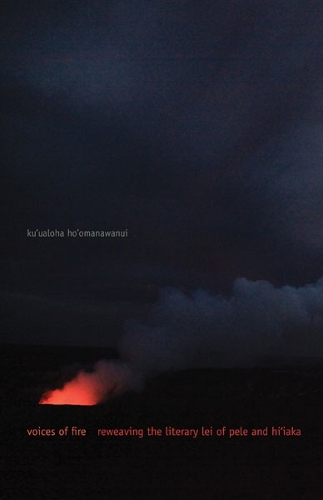
Voices of Fire: Reweaving the Literary Lei of Pele and Hi'iaka
(Hardback)
Available Formats
Publishing Details
Voices of Fire: Reweaving the Literary Lei of Pele and Hi'iaka
By (Author) ku'ualoha ho'omanawanui
University of Minnesota Press
University of Minnesota Press
7th August 2014
United States
Classifications
General
Non Fiction
Social discrimination and social justice
Ethnic groups and multicultural studies
398.09969
Physical Properties
Hardback
312
Width 140mm, Height 216mm, Spine 38mm
Description
Stories of the volcano goddess Pele and her youngest sister Hi'iaka, patron of hula, are most familiar as a form of literary colonialism--first translated by missionary descendants and others, then co-opted by Hollywood and the tourist industry. But far from quaint tales for amusement, the Pele and Hi'iaka literature published between the 1860s and 1930 carried coded political meaning for the Hawaiian people at a time of great upheaval. "Voices of Fire "recovers the lost and often-suppressed significance of this literature, restoring it to its primary place in Hawaiian culture.
Ku'ualoha ho'omanawanui takes up "mo'olelo" (histories, stories, narratives), "mele" (poetry, songs), "oli" (chants), and "hula" (dances) as they were conveyed by dozens of authors over a tumultuous sixty-eight-year period characterized by population collapse, land alienation, economic exploitation, and military occupation. Her examination shows how the Pele and Hi'iaka legends acted as a framework for a Native sense of community. Freeing the "mo'olelo" and "mele" from colonial stereotypes and misappropriations, V"oices of Fire" establishes a literary "mo'ok'auhau," or genealogy, that provides a view of the ancestral literature in its indigenous contexts.The first book-length analysis of Pele and Hi'iaka literature written by a Native Hawaiian scholar, "Voices of Fire" compellingly lays the groundwork for a larger conversation of Native American literary nationalism.
Reviews
"ku'ualoha ho'omanawanui artfully performs the cultural and intellectual labor of overturning dominant paradigms and creating new ways of seeing and being an Kanaka 'Oiwi (Indigenous Hawaiian) woman and member of the Lahui (Nation) that draws inspiration from the volcano goddess Pele and her favored youngest siste Hi'iaka, patron of hula. This is an important and exciting book." Ty P. Kawika Tengan, author of Native Men Remade: Gender and Nation in Contemporary Hawai'i
"An amazingly well-crafted, well-selected, and well-analyzed lei that is, in and of itself, an incredibly powerful narrative destined to become an integral component of the intellectual lei of Kanaka Maoli literature."Native American and Indigenous Studies Journal
Author Bio
kuualoha hoomanawanui is associate professor of Hawaiian literature in the English department at the University of Hawaii at Manoa.
